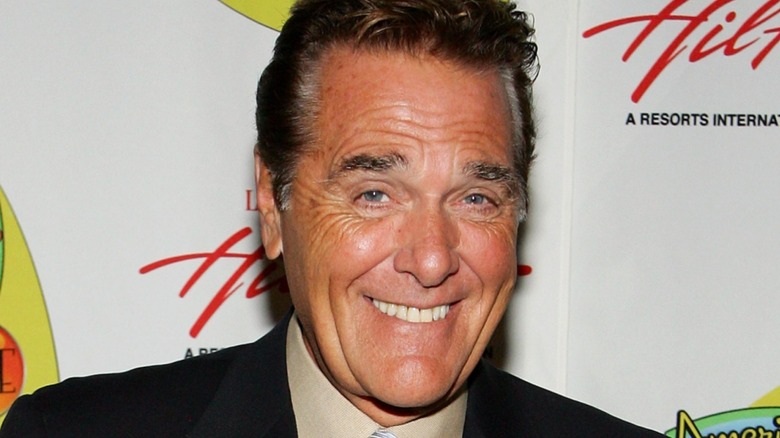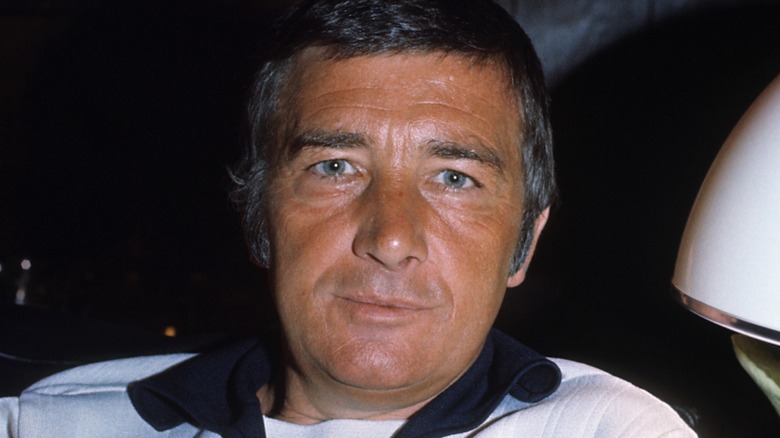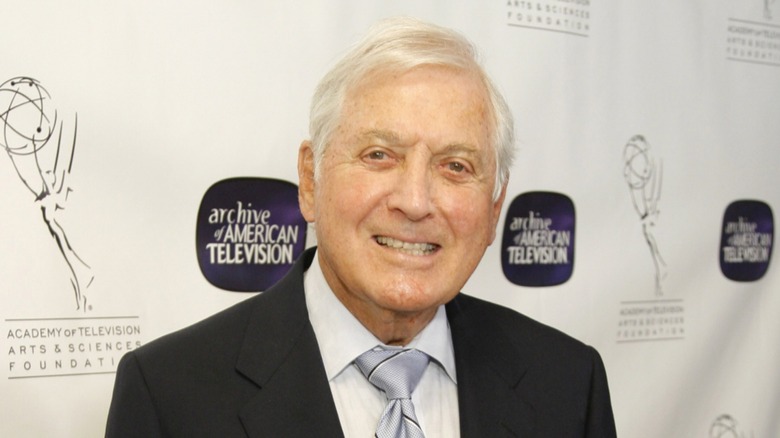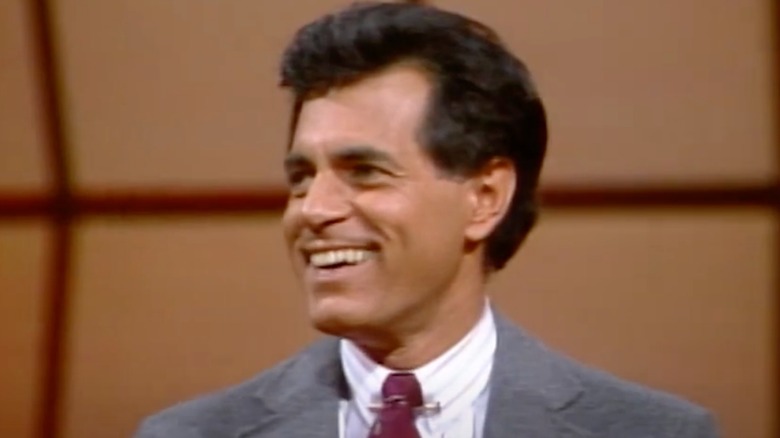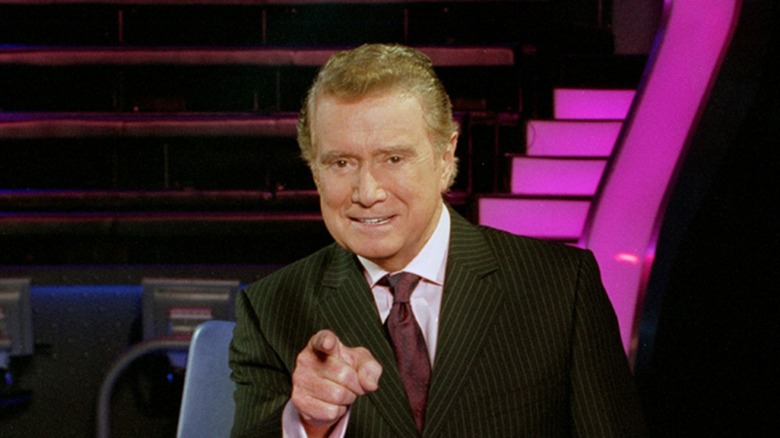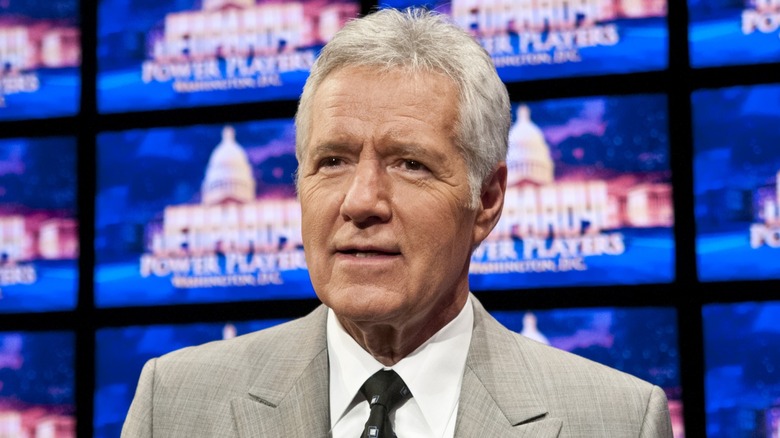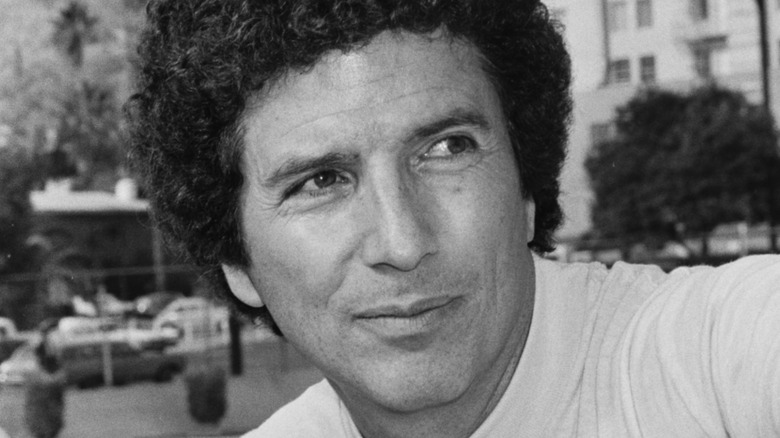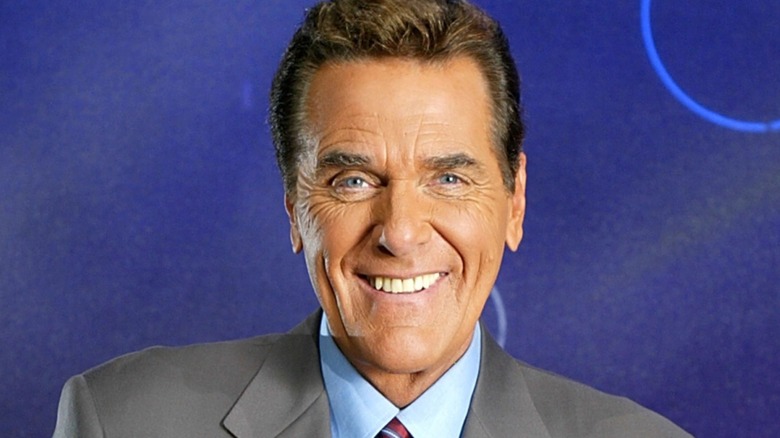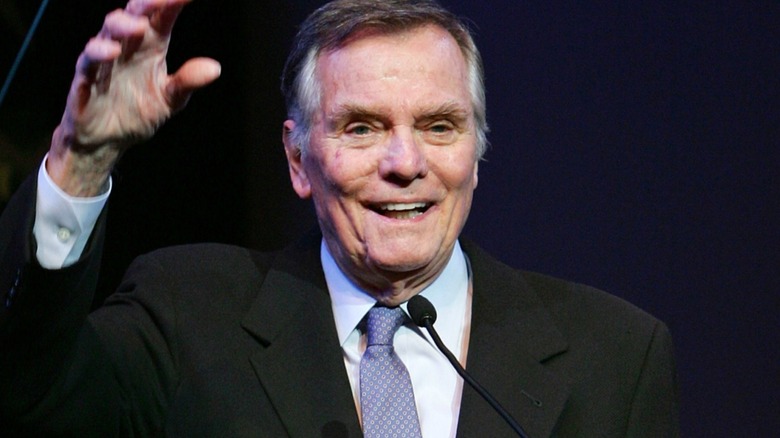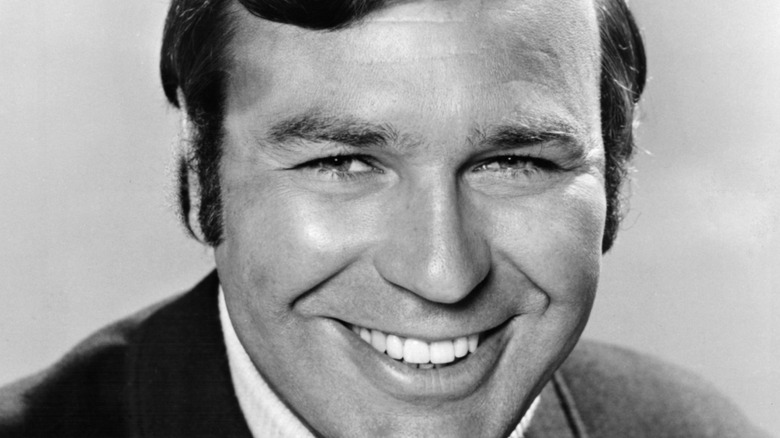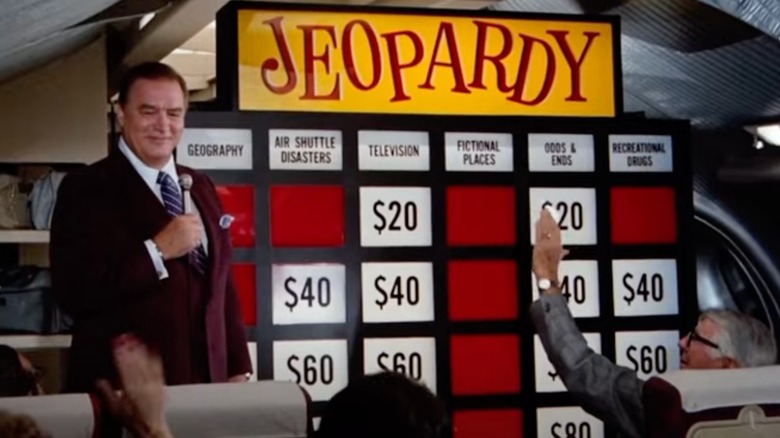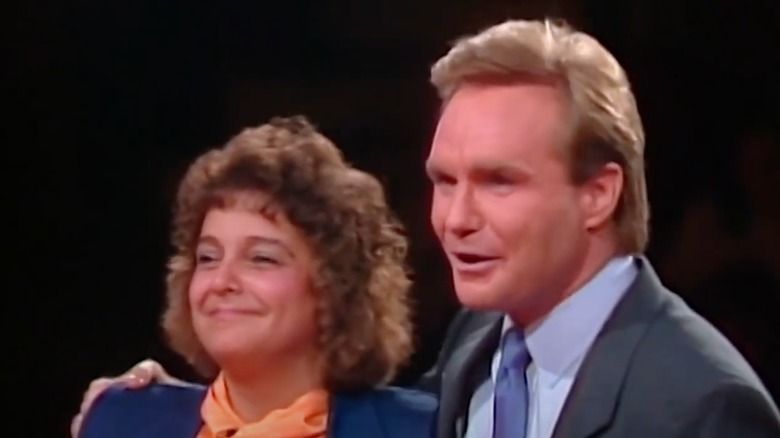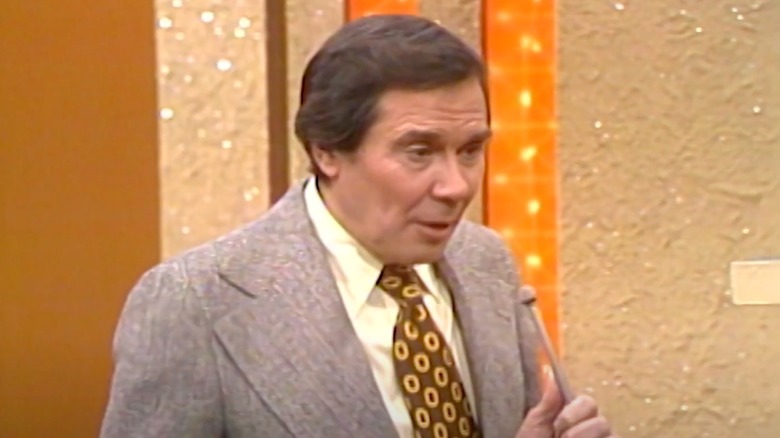Game Show Hosts You Didn't Know Died
If television game show hosts leave any kind of impression on viewers, then they must have been pretty good at their jobs. Leading a game show requires a particular and varied set of skills — hosts have to be charming and friendly enough to connect with viewers, keep the festivities moving along at a brisk pace, and also be a reassuring presence to contestants going through the nerve-wracking experience of trying to win fabulous prizes or a life-changing amount of money under hot studio lights and with millions watching at home. It's not easy being a game show host, and there's probably a reason why only a handful of performers have ever made a living as the host of daytime or primetime competitive programming.
By the nature of working on TV for years or even decades at the same job, those hosts become fixtures, welcomed virtually into millions of fans' homes each night or each week. And then, once their show goes off the air, or they retire, they fade into obscurity. Here are some once mega-famous and well-liked game show hosts who died without the kind of fanfare one might expect from the emcees of beloved TV classics.
Richard Dawson
Born in England in 1932, Colin Lionel Emm became a stand-up comedian in the late 1940s under the stage name Richard Dawson. That led to American sitcom jobs, particularly that of Corporal Newkirk on "Hogan's Heroes," which ended its run in 1971. Dawson was just the kind of fringe celebrity that '70s panel game shows needed. Along with stints on "I've Got a Secret" and "Tattletales," Dawson would appear on nearly 1,400 episodes of both the daytime and nighttime runs of "Match Game" during the decade, while also hosting a revival of the older TV chestnut "Masquerade Party" as well as "Family Feud."
The latter, which pitted one family against another as they tried to guess the most popular answers given by survey participants, starred Dawson for nine years. At one point, "Family Feud" was both the most-watched daytime show and the most-watched syndicated game program, justifying Dawson's status as his genre's top-earning host. With the show running as many as 11 episodes a week, Dawson developed some signature bits, including his overly familiar repartee with the male contestants and almost always kissing the female ones.
In June 2012, Dawson's son, Gary, announced that his father had died at UCLA Medical Center in Los Angeles. The cause of death was the effects of cancer of the esophagus; Dawson was 79.
To learn more about the legendary game show host, read our feature about the untold truth of Richard Dawson.
Monty Hall
After ditching his scientific degree in the 1950s to be a performer, Monte Halparin changed his name to Monty Hall, moved from Canada to the U.S., and in 1960, got his first game-show hosting job leading CBS' "Video Village," a real-life re-creation of a board game. It aired for three years, at which point Hall landed at ABC with a game show he co-created with writer Stefan Hatos, "Let's Make a Deal." All about bartering and trading up, the show featured contestants who were picked out of the audience to play games and negotiate their prizes; it became customary for wannabe participants to dress in wild costumes or carry big signs to get Hall's attention. The first version of "Let's Make a Deal" aired until 1976, while Hall would ultimately host thousands of episodes of his show across different productions. "Let's Make a Deal" even inspired a famous math brainteaser known as "the Monty Hall problem," which uses the show's signature three-door setup to illustrate the sometimes counterintuitive nature of probability.
In September 2017, Hall died at home in Beverly Hills. The cause of death was heart failure; Hall was 96 years old.
Peter Tomarken
Peter Tomarken kept things moving along, but he never took himself or his game-show hosting duties too seriously. He's best known for his 750-plus-episode stint hosting "Press Your Luck" in the 1980s, the show that got contestants to slam a plunger to stop the spinning game board in hopes of winning cash and prizes and avoiding the "Whammy!" — an animated devil that eliminated winnings. During his mid-1980s heyday, Tomarken also hosted the short-lived game shows "Hit Man," "Bargain Hunters," and "Wipeout," where he was also a producer and a writer.
In addition to narration and acting work — he did voiceovers for "Playboy" branded home videos and popped up in episodes of "The Rockford Files," "Medical Center," "The New Mike Hammer," and "Ally McBeal" — Tomarken was a licensed pilot, and he volunteered his time and skills to charitable causes. While flying an air transport mission for Angel Flight West in March 2006, Tomarken's plane experienced mechanical failure and crashed into the Pacific Ocean. The bodies of Tomarken and his wife, Kathleen, were later recovered by authorities. The game show host, one of many performers tragically killed in plane crashes, was 63 years old.
Regis Philbin
Though he's best known as a talk show host, Regis Philbin's prodigious television career is laced with game shows. By 1975, when he hosted the flops "The Neighbors" and "Almost Anything Goes," Philbin was a well-known TV star — a former actor, news anchor, and announcer on ABC's "The Joey Bishop Show," briefly a competitor of NBC's "The Tonight Show." After the two failed game shows, Philbin co-hosted a succession of local morning talk shows in Los Angeles and New York, and one of them went national in 1988, becoming "Live! With Regis and Kathie Lee." That series lasted for decades and became so popular that it led to dozens of other jobs for Philbin, including ABC's 1999 game show "Who Wants to Be a Millionaire," which awarded one of the biggest payouts in game show history. Philbin would ask a single contestant successively harder questions until they got to the $1 million-winner. It won the host, who made "Is that your final answer?" inescapable, a Daytime Emmy award, and was so captivating that ABC aired it multiple nights a week — the three most-watched shows of the 1999-2000 TV season were all "Millionaire" airings.
A Guinness World Record holder for appearing on TV more than anyone else, Philbin semi-retired in 2011, and he died in July 2020 from heart issues. He was 88.
Alex Trebek
The source of many secrets game shows don't want you to know, the current TV version of "Jeopardy!" has been running since 1984. From its inception until October 2020, the authoritative and measured Alex Trebek served as the show's unflappable host. Even when bizarre things happened on the "Jeopardy!" set, Trebek played it cool as he read out the "answers," or clues presented as statements, and fielded the quick-clicking contestants' responses — phrased in the form of a question, lest they earn a gentle admonishment from the host to do so.
"Jeopardy!" was merely Trebek's longest-running show; he hosted lots of other games. A native Canadian, Trebek oversaw 1960s Canadian game shows including "Strategy" and "Reach for the Top." After moving to the U.S. in the 1970s, Trebek hosted a string of quiz shows that included "The Wizard of Odds," "The Magnificent Marble Machine," "The $128,000 Question," and "The New Battlestars." Concurrently with "Jeopardy!" Trebek starred on "To Tell the Truth" and "Classic Concentration." He won the Emmy Award for outstanding game show host eight times.
In a 2019 YouTube video, Trebek announced that he had stage IV pancreatic cancer but assured his fans he survive the disease because his "Jeopardy!" contract required him to host the show for three more years. After filming what would be his last episodes of the show in October 2020, he died eight days later. Trebek was 80.
Bert Convy
A former minor league baseball player and rock musician, Bert Convy became a celebrity when he discovered acting and singing. He co-starred in the original Broadway productions of "Cabaret" and "Fiddler on the Roof" in the 1960s before focusing on film and TV roles in the 1970s. That's when he started hosting a lot of game shows, too. From 1974 to 1977, and again from 1982 to 1984, he hosted the comically probing spousal show "Tattletales," which won Convy a Daytime Emmy for best game show host. Along with hosting "3rd Degree!" and a "Match Game" revival, Convy presided over "Super Password" for more than 1,100 episodes in the latter half of the 1980s. When Burt Reynolds wanted to create a game show in which contestants had to correctly guess what a teammate drew on a big tablet, he connected with Convy, his co-star in "Semi-Tough" and "The Cannonball Run." Along with Reynolds, Convy was an executive producer on "Win, Lose or Draw," which ran from 1987 to 1990.
Also in 1990, Convy was diagnosed with a brain tumor, which he didn't publicly disclose. While visiting his mother at Los Angeles' Cedars-Sinai Medical Center in 1991, he fell ill and then returned to his home in Brentwood, California, where he died. Convy was 57.
Chuck Woolery
Suave, sunny, and self-aware of his innate corniness as one of America's go-to game show hosts for decades, Chuck Woolery led one TV show or another almost continuously from the mid-1970s until well into the 2000s. He first appeared on numerous talk and variety shows in the '60s as a musician, but a gig on "The Merv Griffin Show" led to Woolery's first hosting job in 1975: heading up the original, NBC daytime version of "Wheel of Fortune." He left the word puzzle game after six years, leaving him time to host another long-running show for NBC, "Scrabble," as well as "Love Connection." The he said-she said relationship show, which consisted mostly of a curious Woolery interviewing contestants about their often disastrous dates, ran for more than 2,000 episodes between 1983 and 1994. In the later years of his career, Woolery hosted Fox's primetime gameshow "Greed" in 1999 and GSN's "Lingo" from 2002 to 2007 before taking a turn at conservative punditry.
In November 2024, Woolery died at home in Texas. The TV personality was 83.
Peter Marshall
Something of a utilitarian performer who could handle anything the burgeoning format of television required in the 1950s and 1960s, Peter Marshall worked as a singer, actor, frequent talk show guest, and one-half of the comedy duo Marshall and Farrell. In 1966, he landed the gig that would make him very famous and a daily presence in millions of homes: hosting "The Hollywood Squares" on NBC's daytime slate. For 15 years, Marshall made the regular-folks contestants feel comfortable while they all joked around with celebrities who gave wild and sometimes true responses to questions, all in a tic-tac-toe format. Responsible for some of the the most bizarre answers ever given by game show contestants, "The Hollywood Squares" landed Marshall four Daytime Emmy Awards for best game show host and propelled him back into the trenches of episodic television. He acted on "Fantasy Island," "The Love Boat," and "WKRP in Cincinnati" and later hosted or showed up as a guest of honor on shows like "Fantasy," "Yahtzee," "Family Feud," and a newer version of "Hollywood Squares."
In August 2024, Marshall died at his home in Los Angeles. The cause of death was kidney failure; the game show host was 98 years old.
Jim Lange
While working as a disc jockey, Jim Lange was hired in 1962 to be the announcer and sidekick on "The Tennessee Ernie Ford Show." That's where game-show producer Chuck Barris discovered Lange and offered him the chance to host "The Dating Gate," a matchmaking show where a single person would choose from three eligible romantic partners based solely on their answers to leading questions. Lange hosted the provocative series from 1965 to 1980, by which point it was known as "The New Dating Game," also serving sometimes as the chaperone on the trips awarded to winning couples. Throughout the 1970s and 1980s, Lange also helmed "The New Newlywed Game," "$100,000 Name That Tune," "Spin-Off," "Oh My Word," and "Hollywood Connection."
Lange died of a heart attack at home in Mill Valley, California, in February 2014. He was 81.
Art Fleming
In its original incarnation as an NBC daytime series airing from 1964 to 1975, "Jeopardy!" was a very tough trivia show, testing contestants' knowledge of arcane and academic subject matter. Such a show needed an appropriately stately host, and creator Merv Griffin found one in actor Art Fleming, who'd portrayed authority figures on TV dramas in the early years of the medium while also hosting variety and game shows like "The Vaudeville Show" and "Stump the Stars." Fleming hosted the first "Jeopardy!" as well as the short-lived late '70s revival "The All New Jeopardy!" and a radio version of the TV game show "College Bowl." When "Jeopardy!" returned as a syndicated series in 1984, Alex Trebek got the hosting slot over Fleming, but he was so associated with that game show that he made dozens of appearances as a host of a live version at conventions and events, and turned up for cameos as himself in "Airplane II" and "Weird Al" Yankovic's music video "I Lost on Jeopardy."
Fleming died at home in Crystal River, Florida, in April 1995, following a pancreatic cancer diagnosis. He was 70 years old.
Ray Combs
In 1982, former missionary and Midwestern furniture salesman Ray Combs moved to Los Angeles to try to become a stand-up comedian. He booked gigs doing audience warm-up for tapings of sitcoms like "The Facts of Life" and "The Golden Girls," and after performing on "The Tonight Show," he signed a deal to host a 1988 revival of "Family Feud," which had only been off the air for three years. Six years later, Combs was out of the CBS daytime version of the show, replaced by original "Family Feud" host Richard Dawson. Combs went on to host a season of the "Double Dare"-like "Family Challenge" and the brief-run series "The Love Psychic."
After he endured injuries in a 1994 car accident that left him in continuous pain, Combs' marriage ended with a second divorce filing, following a reconciliation attempt. In June 1996, he told a friend he planned to hurt his estranged wife, and after it was established that Combs had attempted suicide, police admitted him to Glendale Adventist Medical Center outside Los Angeles, where he was placed under psychiatric evaluation. Combs, who was 40 years old, died by suicide the following morning.
If you or someone you know is struggling or in crisis, help is available. Call or text 988 or chat 988lifeline.org
Gene Rayburn
In the 1970s, the most popular daytime game show for many years was "Match Game," a loose and breezy affair in which a panel of six minor celebrities would fill in the blank of a suggestive question and a contestant would get points if they matched what the panelist secretly wrote down. The guests were often at least a little tipsy, and it was a raucous affair with the laid-back and jocular Gene Rayburn presiding over it all before it turned into chaos. By the time Rayburn started hosting the '70s version of "Match Game," he was in his mid-50s and a show business veteran. Once an opera singer, he pioneered drive-time morning radio in New York City in the 1940s, filled the role of sidekick on Steve Allen's "The Tonight Show" in the 1950s, and did a lot of theater, too. In addition to thousands of episodes of various daytime, night-time, and revival versions of "Match Game," Rayburn also guest-hosted "Tattletales" and appeared on other panel shows as a participant, including "The Hollywood Squares," "To Tell the Truth," "Password," and "I've Got a Secret."
In November 1999, Rayburn was at his daughter's residence in Gloucester, Massachusetts, when he experienced congestive heart failure and subsequently died. The entertainer and game show host was 81 years old.
